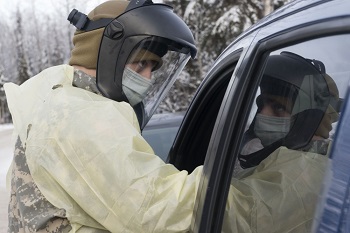 U.S. Army Pvt. Daniel Murtagh, a combat medic specialist, wears personal protective gear as a frontline worker testing drive-thru patients for COVID-19 at Joint Base Elmendorf-Richardson, Alaska in November 2020. (Photo by Airman 1st Class Emily Farnsworth)
U.S. Army Pvt. Daniel Murtagh, a combat medic specialist, wears personal protective gear as a frontline worker testing drive-thru patients for COVID-19 at Joint Base Elmendorf-Richardson, Alaska in November 2020. (Photo by Airman 1st Class Emily Farnsworth)
To ensure a seamless, standardized experience for beneficiaries, the DHA is migrating public-facing military medical treatment facility (MTF) websites to TRICARE.mil. Each migrated site will have the same look and feel to improve ease of access for beneficiaries to quickly locate information. The DHA has established 18 guest wireless sites for the continental U.S. to keep patients and their families up to date on the delivery of care.
The medical community of interest (Med-COI) is a single, enterprise-wide network designed to support military health IT requirements. The desktop-to-datacenter (D2D) program helps standardize the delivery of enterprise services. D2D enables providers and staff access to their personal clinical desktop via any clinical desktop in any MTF.
All Army and Navy MTFs, as well as an increasing number of Air Force MTFs, have received the infrastructure to support the migration to D2D/Med-COI. More than 20 MTFs and their associated clinics have been fully migrated to make them MHS GENESIS ready.
A different, but no less fruitful, creation was a provider “resilience toolkit” for COVID-19 by DHA Connected Health’s mHealth team. The toolkit highlights evidence-based research on self-care tips and health technology tools to promote the resilience of frontline providers and reduce burnout during the pandemic. The toolkit, launched in late March, is being updated to feature a lead video, a series of interview videos with providers, blog posts, a social media toolkit, and more.
“These were existing tools in the DHA digital health portfolio that, when packaged together, met a pressing need in the military health community. The use of digital tools supports social and physical distancing while also allowing our providers an avenue to monitor and improve their stress and anxiety,” said Kelly Blasko, MHS Connected Health Branch mHealth Clinical Integration section lead.
“Based on research from past health crises, we knew that providers were at-risk for the psychological effects of burnout. We saw a drastic increase in the usage of DHA’s recommended digital health tools, ranging from 16% to over 1,000%, during the first six weeks of an awareness campaign,” Blasko said.
The revamped toolkit takes into account lessons learned on provider burnout months into the pandemic. “The self-care strategy and tools continue to fill a need to prevent and alleviate any effects of burnout, increasing provider resilience,” she noted.
In addition, DHA’s Antimicrobial Stewardship app is a centralized platform for promoting standardized practice in treating infectious diseases, including COVID-19.
“The app gathers all the evidence-based resources in one place and is available at your fingertips,” said Dr. Twee Sim, senior medical advisor and chief of the Office of Advanced Clinical Quality Management & Policy Analysis for the DHA. “This is especially important during this pandemic, when providers may be overwhelmed by the multiple and different sources for information.”
The app also supports providers at the point-of-care with relevant guidelines and evidence-based recommendations for treatment.
The app’s information has been reviewed by DHA infectious diseases providers and gives recommendations based on nationally recognized organizations such as the Infectious Diseases Society of America, Centers for Disease Control and Prevention, National Institutes of Health and on the DOD COVID-19 Practice Management Guide.
DHA’s Information Technology & Multimedia Branch (ITMB) is helping to support the needs of the Medical Education and Training Campus (METC) and its students.
The ITMB acquired funding to enhance the cellular signal in the Medical Instructional Facilities, which will help with training and emergency response, METC Public Affairs said. ITMB is migrating its network from the Army to the Med-COI. ITMB coordinated an improved Wi-Fi network across dorms, ships and barracks to support students with remote access to training materials.
The METC has transferred a number of programs of instruction to the College of Allied Health Sciences (CAHS), Uniformed Services University, making CAHS the institution of record for college credit. METC plans to move more programs to CAHS.
In addition, the METC formed a distance and blended learning working group because of the COVID-19 crisis. Although much of the education and training is hands on, several programs stepped up to provide students with remote access to training materials. These actions helped to ensure the safety of students and instructors, as well as to assist students in isolation to keep up with their classmates. To date, 11 programs can use distance and blended learning.